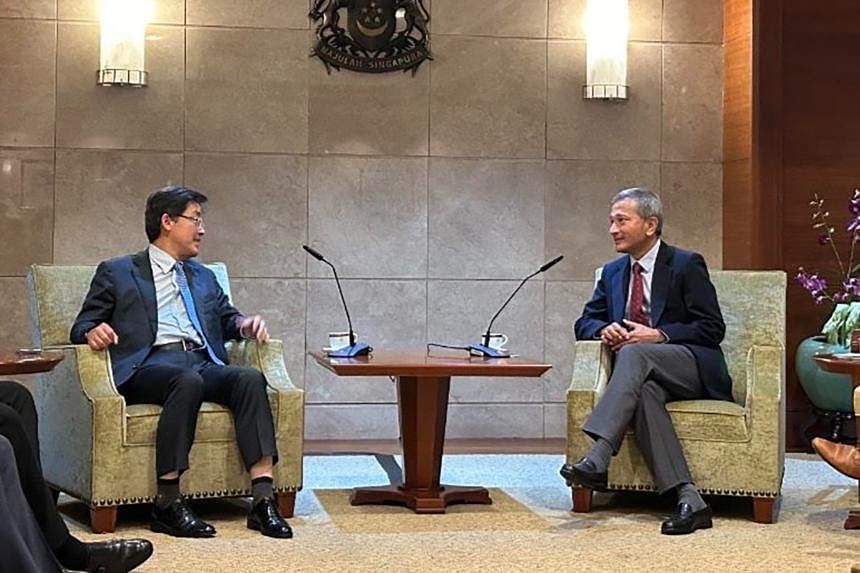SINGAPORE – Nothing is off the table as South Korea seeks to deepen ties with South-east Asia, with a key adviser to the South Korean President describing the relations as a “lifeline and not a luxury item”.
“The whole Asean region is very important to us,” said Dr Park Cheol-hee, chancellor of the state-affiliated think-tank Korea National Diplomatic Academy, which also trains South Korean diplomats.
“There is nothing that we cannot do here, and we have a great advantage in approaching this region,” he said.
“We have no historical baggage here like Japan has. Korea does not pose any security threat to any Asean country. We don’t have any hidden agenda to exploit Asean economically or culturally. We are sharing our benefits. The good thing is we have laid a kind of trustworthy and reliable foundation of cooperation between Korea and Asean countries,” he said.
Dr Park spoke to The Straits Times on May 3, the last day of his three-day trip to Singapore to meet think-tanks and senior Foreign Ministry officials.
South Korea made great strides in deepening engagement with South-east Asia during the administration of former president Moon Jae-in. He launched in 2017 his signature New Southern Policy, which sought to elevate ties with the regional bloc to the same level as four major powers – the United States, Japan, China and Russia.
Mr Moon was the first South Korean president to visit all 10 Asean countries during his term. His government not only pushed to bolster economic cooperation with Asean nations, but also actively promoted the region to South Koreans ahead of the 2019 Asean-Republic of Korea Commemorative Summit.
Asean has become South Korea’s second-largest trade partner, after China. Bilateral trade between South Korea and Asean grew from US$147 billion (S$198.4 billion) in 2017 to US$208 billion in 2022, while South Korea’s investment in Asean increased from US$5.28 billion in 2017 to US$8.89 billion in 2021.
After Mr Yoon Suk-yeol took office in May 2022, scholars voiced concern that South Korea’s ties with Asean would take a major hit after being shoved under a broader Indo-Pacific Strategy led by the US.
While Mr Yoon announced his administration’s Korea-Asean Solidarity Initiative (Kasi) during his November 2022 trip to Phnom Penh to attend the 23rd Asean-Republic of Korea Summit, it has not been widely promoted yet given South Korea’s other priorities. They include closer alignment with South Korea’s security ally the US, restoring strained ties with Japan, and bolstering engagement with the Middle East.
Things may change, however, as South Korea and Asean mark 35 years of diplomatic ties in 2024.
Dr Park, who is known as Mr Yoon’s diplomatic brain, visited Singapore and Malaysia as part of a larger study trip that also took him to Vietnam, Thailand and Indonesia in February.
While in Singapore, he met Foreign Minister Vivian Balakrishnan, Ambassador-at-Large Tommy Koh and ambassador Ong Keng Yong, who is also executive deputy chairman of the S. Rajaratnam School of International Studies.
They discussed the region’s geopolitical and geo-economic situation, according to the South Korean Embassy in Singapore.
“When I return to Seoul, I will report to our foreign minister and, then, the Office of the President. They will ask me what can be done, and I will answer, ‘There is nothing that we cannot do,’” Dr Park said, referring to collaboration with Asean.
“I will convey the message that this region should be regarded much more importantly than before, in all domains, not only economy and trade, but also capacity building, industrial cooperation, R&D (research and development), people-to-people exchange, and cultural connections.”
Dr Park also said their Asean approach this time will be a lot more comprehensive and realistic compared with the previous Moon administration, which he said was more focused on pursuing peace on the Korean peninsula and resolving North Korea’s nuclear issue through collaboration with Asean.
Mr Moon’s New Southern Policy was borne out of South Korea’s need to diversify its diplomacy and reduce economic dependence on traditional partners, in the wake of China’s economic retaliation over South Korea’s deployment of an American anti-ballistic missile defence system that Beijing deemed as a security threat.
But the policy also worked to South Korea’s favour when it played a key mediating role in the first US-North Korea summit held in Singapore in 2018, followed by another one in Vietnam in 2019.
Citing Mr Yoon’s own Asean plan Kasi, Dr Park said it is specifically tailored to the needs of South-east Asian countries and includes a list of some 100 items of cooperation that any Asean nation can pursue with South Korea.
“We are going to take a much more concrete, detailed and action-oriented approach to get tangible outcomes,” he added. “Kasi is truly tailored to Asean countries only. Each country can take a look at the list and see what they can do with Korea and bring it to their Korean ambassador or the Foreign Ministry, and we can go further.”
Core areas of collaboration include defence cooperation, maritime security, economic security, digitalisation, climate change and cultural exchanges. There are also plans to increase funding for Asean-Korea cooperation projects.
“The priority is elevating the level of cooperation between Korea and Asean to a much more comprehensive strategic partnership. That is the overall framework we are aspiring to achieve and we are heading towards that,” said Dr Park.
“Again, we are not approaching Asean as a luxury item. This is a very critical and necessary item for us.”


